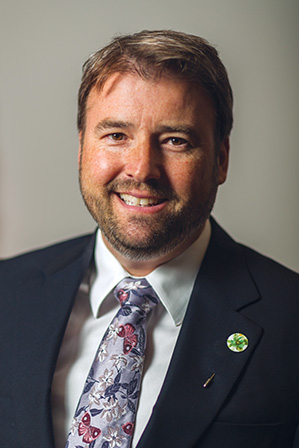Don’t Be a Heather
State VP Voice
BY KENNETH KERO-MENTZ

One of my favorite movies of all time is the 1988 cult classic “Heathers,” starring Wynona Ryder and Christian Slater as high school students with a dark side. The Heathers of the title role are a trio of bullies each named Heather who, while beautiful and popular, are cruel and vindictive to their peers and create a toxic school environment. Sound familiar?
When I joined the Foreign Service, we heard about the importance of good leadership in A-100. We also heard about how to manage “challenging” bosses, the ones who “move mountains for you, or on top of you” or the ones who “kiss up and kick down.”
It took almost a decade in the Service, but when it was my turn to confront a bully boss, I created a “Heathers” subfolder on my computer in which to store all the nasty emails she sent my way, as well as notes documenting her unnecessary abuses.
I was lucky. I was eventually able to push back (with the help of the ambassador), and the inappropriate behavior toward me mostly ceased. Sadly, this Heather just turned her animus on others at post: a military attaché, a family member, a first-tour officer, etc. It wasn’t easy to experience, or to witness, and it made me wonder: how do people like this get ahead in our Foreign Service?
This spring, as AFSA was negotiating with the department over the procedural precepts that instruct the Selections Boards on the promotion process, we scored a minor victory that could have a major impact down the road.
The boards were urged to pay close attention to employees who clearly demonstrate superior leadership and mentoring skills—in other words, those who truly care about the well-being of their colleagues and subordinates, enhance the work environment and encourage teamwork. Those who do will receive commendation following the promotion season.
After losing so many of our Foreign Service leaders during the past 18 months, we have a powerful opportunity to shape our senior ranks by paying close attention to the leadership attributes that matter.
After losing so many of our Foreign Service leaders during the past 18 months, we have a powerful opportunity to shape our senior ranks by paying close attention to the leadership attributes that matter.
Nicely spelled out in the precepts and the Foreign Affairs Manual, those attributes include things like a desire to collaborate, an interest in developing the next generation, the ability to manage conflict supportively and the talent to foster resilience.
Why did we push for this change? Because we’re still hearing from members who are dealing with bad leaders and bully bosses who publicly belittle, humiliate and beat down those around them. They undermine, condescend and demean. They’re bad for morale; and when morale suffers, productivity suffers. Without a doubt, things are better than they were years ago, but that’s not our standard. We should aspire to be the best.
And we in the Foreign Service enjoy a special role: we ourselves determine whom to promote and whom to show the door. It’s a massive responsibility, and as stewards of the Foreign Service, it’s one we hold in the highest regard.
Asking the promotion panels to be on the lookout for top-quality leaders is a good first step, because it moves the right people to the top and sets them up as examples for the rest of us to follow. It shows the bullies that their tactics won’t work. And if folks with superlative leadership skills and behaviors move up in our system, it will have a reverberating effect on our Service.
We’re looking at ways to tackle the problem of bully bosses, and we want your input. We want to hear from those who have faced them, and those who’ve challenged them. Our EERs require impressing the rater and reviewer, which begs the question—how do we hear from those supervised by a bully boss? How can their input be incorporated into the bully’s EER? We’re interested in your ideas. Please send them to afsa@state.gov.
Bullies rarely get positive results. Instead, they face staff curtailments, low morale and disgruntled employees. We’re looking for ways to tackle the problem because we want State to be the best place to work, and to be led by the best, so that we can do our best for the American people.
I’ve always said that AFSA is here to make State a little kinder, and I stand by that. As Wynona Ryder’s character says (after she knocks off one of the Heathers), “I just want my high school to be a nicer place. Amen.” I bet we all want the same for our State Department. So whatever you do, don’t be a Heather.

